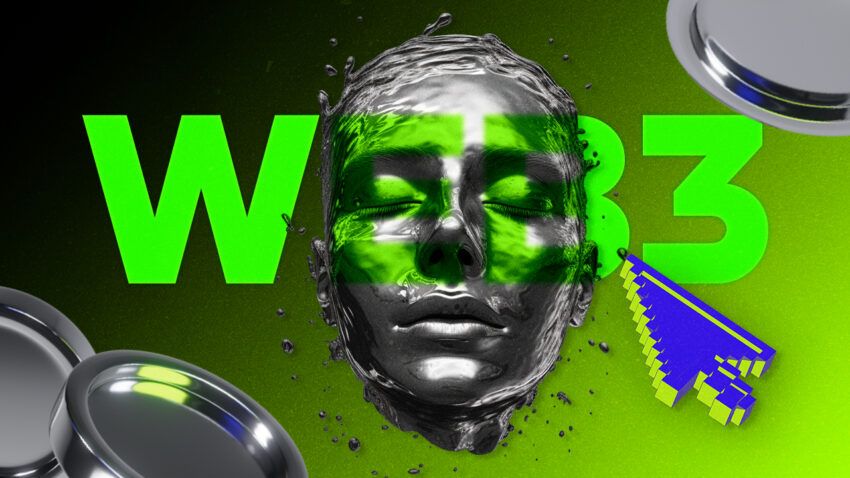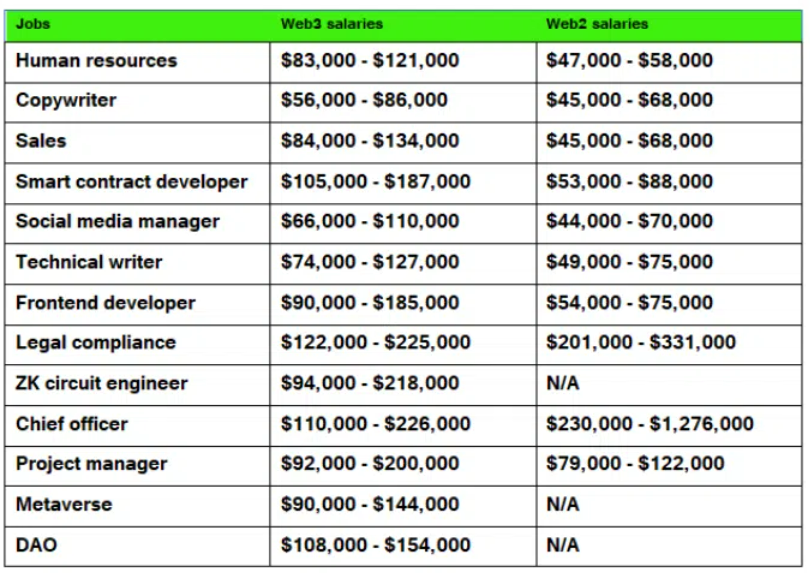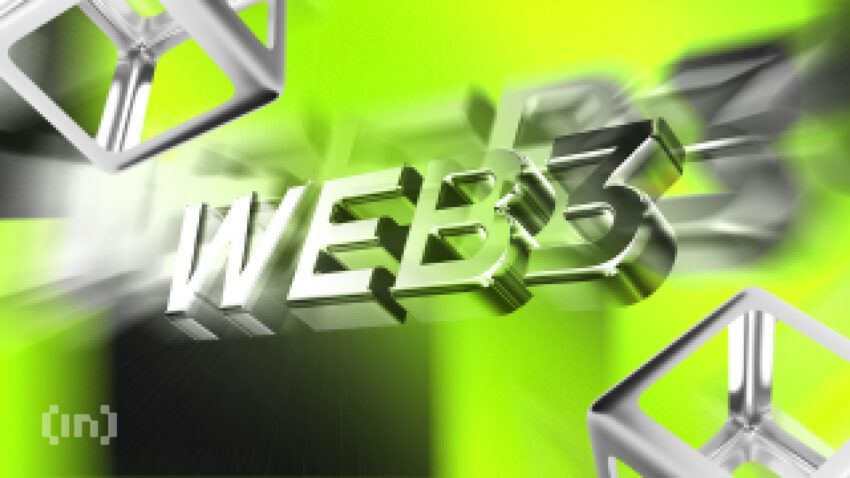Web3 isn’t just a buzzword. This brand-new market is filled with potential that promises to disrupt the whole tech industry and create various job opportunities. Looking to start a career in the decentralized ecosystem but don’t know how or where to begin? This guide covers what you need to know about web3 careers.
Is web3 a good career?

Web3 can be an excellent path for several compelling reasons. The job market in web3 is quite diverse and offers many opportunities compared to traditional industries.
As more industries, including finance, fashion, and music, adopt web3 technologies, the demand for professionals with relevant experience and expertise also increases. That includes many areas of web3, including cryptocurrency, smart contracts, NFTs, blockchain technology, decentralized applications (DApps), and so on.
But the good news is that the web3 industry also demands more traditional roles that are necessary to set the business foundation most companies require. These mainstream jobs include product managers, community managers, marketers, writers, developers, and HR professionals, to name a few.
In other words, if you fancy starting your path in web3 but have no crypto background, you can still apply for a more common position. Another perk of working in web3 is that the industry offers a decentralized and transparent ecosystem, providing individuals with more autonomy and control over their work. For those looking for a flexible and collaborative working environment that fosters innovation and autonomy, a job in web3 might be just for them.
Lastly, the potential for financial growth and upward mobility in the web3 space is significant as it becomes more integrated into mainstream industries and garners more investment.
Find your dream job
Connect with your true soulmates
Web2 vs. web3 career salaries
Of course, some positions are in higher demand. According to some HR specialists, there are not enough suitable candidates. Julia Motorina, recruiting team lead at BeInCrypto, highlights the struggle to find these top-notch candidates:
“Currently, we’re looking for a Java Software Developer with experience in Blockchain projects (experience with Blockchains account and UTXO based accounts; BIPs/EIPs, etc.), and it’s a tough one. There are not that many companies where specialists use all the skills required.
Even junior candidates with a part of the skills required are overpaid, even considering the market conditions. Companies with good budgets are hiring and giving the opportunity for these specialists to learn these skills. But other companies are simply struggling to find their “perfect match,” losing ambitious and promising specialists and increasing the hiring time.”
Julia Motorina, recruiting team lead at BeInCrypto: BIC

How can I build a web3 career?
If you’re new to the web3 industry and have no prior expertise, landing a job can seem challenging. But don’t worry — with the right approach and some effort, you can land your dream job in the crypto industry without prior experience working in web2.
Before flipping from crypto holder to working in crypto, there are a few things you should consider doing that will increase your chances of starting a professional journey in the web3 space.
1. Understand the fundamentals
Before delving into web3, it’s crucial to grasp the underlying concepts of blockchain technology and cryptos. Study the principles of decentralization, cryptographic hashing, and distributed ledger systems.
Get familiar with various blockchain platforms like Ethereum and Polkadot, and understand their unique features and use cases. Learning about consensus algorithms, such as proof-of-work (PoW) and proof-of-stake (PoS), will give you insights into how transactions are validated in different networks.
2. Educate yourself
The web3 space is constantly evolving, so continuous learning is essential. Enroll in online courses or educational platforms that offer in-depth tutorials on Web3 development. Explore topics like smart contract programming, decentralized application (DApp) development, and how to interact with blockchain networks programmatically using APIs.
Consider taking courses on specific blockchain platforms you are interested in, as each has its own tools, libraries, and best practices.
3. Join web3 communities
Engaging with the web3 community provides a wealth of knowledge and networking opportunities. Join online forums like Reddit’s r/ethereum and r/polkadot, follow blockchain experts on Twitter, and participate in Telegram or Discord groups dedicated to Web3 development.
Actively engage in discussions, seek advice, and collaborate on open-source projects to enhance your skills and build your reputation within the community. BeInCrypto offers an exclusive Telegram channel, Work[In]Crypto, that provides invaluable content, connections, a knowledge for both HR experts and job seekers.
Explore coding
As opposed to what many people might think, coding isn’t a skyrocketing science. With a bit of effort and willingness to learn, you can start your coding journey.
Mastering coding languages and frameworks relevant to web3 development is essential for success. If you aim to work with Ethereum-based projects, focus on Solidity, the most widely used smart contract language. For Polkadot, Rust is a primary language for developing parachains and smart contracts. Also, learn about web3.js and other libraries that facilitate interactions with blockchain networks.
Develop personal projects
Hands-on experience is invaluable in the web3 industry. If you are a proven professional in your field of expertise and the only thing you lack is experience in crypto, developing your own projects can showcase your interest in joining the web3 space.
Create your own projects to apply the knowledge you’ve gained. Build a decentralized application (DApp) that solves a real-world problem or experiment with creating your own NFTs and deploying them on a testnet. Showcase your projects on platforms like GitHub or CodePen to demonstrate your abilities to potential employers or collaborators.
Stay up to date
The web3 landscape is dynamic, with frequent updates, new tools, and innovations. Stay informed by following the latest developments through blogs, industry news outlets, and official announcements from blockchain platforms. Attend virtual conferences, webinars, and workshops to stay at the cutting edge of web3 technology.
Explore job opportunities
Look for blockchain-related job openings on platforms like LinkedIn, AngelList, and specific blockchain job boards, such as the Be[in]Crypto Jobs Board. These platforms attract candidates with a specific interest and expertise in web3 technologies.
Tailor your resume to highlight your web3 skills, projects, and contributions, and apply for positions that match your expertise and interests.
From web2 to web3 careers: What are some transferable jobs?

Despite the technological shift, the good news is that many roles are transferrable from web2. While the context and specific knowledge might change, the underlying skills and principles, such as coding expertise, design skills, writing, or marketing, can be adapted to the challenges and opportunities within web3.
Software engineer
Web2 software engineers create applications and websites that run on centralized servers. In web3, these roles extend to building decentralized applications (DApps) using blockchain technology and smart contracts. The core skills remain essential, but software engineers in web3 need to understand blockchain protocols, consensus mechanisms, and decentralized data storage. While you may need to learn new programming languages and working methods, many software engineers who previously worked in web3 find lucrative web3 careers.
Data analyst
Transitioning to web3, data analysts can take advantage of their analytical skills to work with on-chain data in the blockchain network. Other than that, these professionals help decentralized projects understand user behavior, assess the efficiency of smart contracts, and help companies gain insights into the web3 market.
Marketing specialist
Every project, whether in web2 or web3, needs a strong and skilled team of marketers. In adjusting to the unique demands of the crypto and blockchain realms, these professionals must ensure they understand tokenomics and learn how to market and promote these projects in decentralized platforms, forums, and crypto communities.
Writer/content creator
Like marketers, writers and content creators looking to move into web2 have ample opportunity to do so. Writers must be able to explain complex concepts in a user-friendly manner, crafting informative content that educates users about blockchain technology, crypto, and web3 products and concepts.
HR experts/recruiters
Sourcing, evaluating, and managing talents in web3 requires a specific set of skills that are different from, yet transferable to, centralized organizations. These professionals must understand decentralized projects and blockchain companies’ unique needs so they can seek and assess the right candidates. In addition, HR experts are required to learn how to manage these professionals and cater to their specific needs.
Soft skills are fundamental in web3 careers
You need excellent soft skills if you’re serious about a web3 career. Adaptability and flexibility are crucial traits for anyone working in web3. The industry experiences constant changes, and professionals must quickly adapt to new technologies, protocols, and market trends.
Collaboration and teamwork are also fundamental. The space is built on the principles of decentralization and community-driven development. Working alongside other developers, designers, and blockchain enthusiasts fosters innovation and creates impactful projects. In most cases, you must be comfortable collaborating in a remote-first environment.
Frequently asked questions
Is web3 a good career?
Is web3 in demand?
What are the best cweb3 careers?
Disclaimer
In line with the Trust Project guidelines, the educational content on this website is offered in good faith and for general information purposes only. BeInCrypto prioritizes providing high-quality information, taking the time to research and create informative content for readers. While partners may reward the company with commissions for placements in articles, these commissions do not influence the unbiased, honest, and helpful content creation process. Any action taken by the reader based on this information is strictly at their own risk. Please note that our Terms and Conditions, Privacy Policy, and Disclaimers have been updated.




